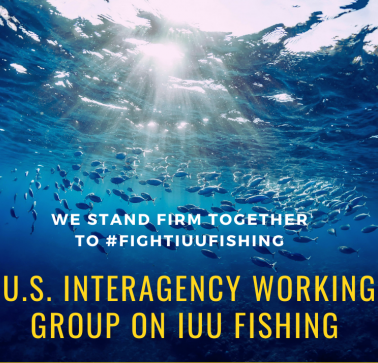 A title image from the interagency working groups' NOAA website.
A title image from the interagency working groups' NOAA website.
A Promising Step Forward in the Fight Against Illegal Fishing
Illegal, unreported, and unregulated (IUU) fishing is broadly defined as any fishing activity that violates national and international fishing laws and threatens U.S. national security. Alyssa Withrow, ASP’s illicit fishing research associate, explains that “IUU fishing endangers food security, threatens livelihoods, degrades ecosystems, undermines the rule of law, is intertwined with transnational organized crime, and hurts economies.” Illegally caught products offer unfair competition to law-abiding fishers while neglecting sustainability measures that, under ideal conditions, would prevent overfishing and environmental degradation, resulting in a significant economic impact.
Who has a solution?
The U.S. Interagency Working Group on IUU Fishing is comprised of several federal agencies to combat IUU fishing both domestically and internationally. Since its inaugural meeting in 2020, the group has formulated a work plan and strategy to carry out its mission to combat IUU fishing and strengthen maritime security.
The working group collaborates between twenty-one U.S. agencies, including the State Department, NOAA, and the Coast Guard. The goal of the working group is to institute an integrated and government-wide response to IUU fishing. In a joint message, NOAA, Department of State, and the U.S. Coast Guard state, “Combating IUU fishing is a top priority for the United States, and communication, collaboration, and strategic coordination will be key in bringing about tangible results.” The group facilitates information sharing and coordination between member agencies as they work to strengthen enforcement measures, advance public-private partnerships, and provide technical assistance on IUU fishing.
The working group was established both by congressional legislation and executive order. First, in 2019, the Maritime Security and Fisheries Enforcement Act (Maritime SAFE Act) called for the establishment of a collaborative interagency group focused on combating IUU fishing. Second, the 2020 executive order also called for interagency collaboration through domestic and international practices (Section 5), specifically for promoting American seafood and economic competitiveness.
What is the plan?
To fulfill its mission, the working group crafted a strategy and work plan that outlines its goals and responsibilities, which are grouped into three main targets.
- Enforcement and Counter-IUU: The primary goal of the working group is to continue and enhance the enforcement of current laws and counter-IUU measures. Through an intergovernmental approach, the working group aims to improve the enforcement capabilities and counter-IUU efforts worldwide, specifically in priority regions and flag states (i.e., those at high risk for IUU fishing). To do this, agencies will collaborate with INTERPOL and the International Monitoring and Control
- Partner Governments: The U.S. has several maritime law enforcement agreements. The working group will continue to honor these agreements and use counter-IUU mechanisms. These agreements and future ones will emphasize training and technical assistance promoting sustainable fishery management and collaborative international initiatives.
- Seafood Imports: The working group will also focus on transparency and traceability within the seafood industry through greater communication and coordination between member agencies. The group will also focus on American competitiveness in the seafood industry, as directed by the 2020 executive order.
The working group currently has three subgroups and one task group, respectively: 1) Gulf of Mexico IUU Fishing, which focuses on counter-IUU and intelligence in the Gulf (see their recent report to congress here); 2) Maritime Intelligence Coordination, which aims to foster collaboration and information sharing; 3) Public-Private Partnerships (PPP), which engages private entities to combat IUU; and, 4) Priority Regions and Priority Flag States, which will identify and maintain a list of high-risk regions and states.
As of 2020, the interagency working group created a list of priorities and began hosting engagements with industry and private sector organizations. The work plan lists tentative completion dates extending throughout late 2021 into 2023.
What is the result?
The working group’s strategy includes measures to increase governmental and regional capacity to enforce regulations and mitigate the effects of IUU fishing worldwide, which promotes the global collective action necessary to address this problem. The emphasis on partnerships both internally within the US and between foreign governments will help foster better communication and coordination on a global scale. The focus on Public-Private Partnerships is especially promising, illustrating the inclusion of industry in proposed solutions.
Aside from reports to Congress and press releases, there has been little additional public information on the working group’s progress. More concrete information about policy recommendations and changes should be forthcoming in the strategic plan, due in December 2021. Overall, the interagency working group is a promising step forward in the fight against IUU fishing with significant work in progress.





